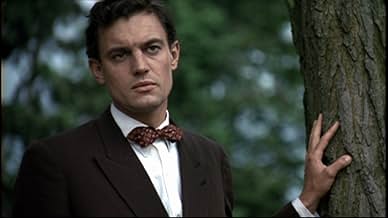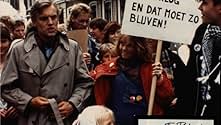IMDb RATING
7.2/10
3.6K
YOUR RATING
A Dutch doctor, haunted by grueling childhood memories of World War II, struggles to find peace as he spends his life looking for answers about the tragic night that shaped him.A Dutch doctor, haunted by grueling childhood memories of World War II, struggles to find peace as he spends his life looking for answers about the tragic night that shaped him.A Dutch doctor, haunted by grueling childhood memories of World War II, struggles to find peace as he spends his life looking for answers about the tragic night that shaped him.
- Director
- Writers
- Stars
- Won 1 Oscar
- 5 wins total
John Kraaijkamp Sr.
- Cor Takes
- (as John Kraaykamp)
Akkemay Elderenbos
- Sandra
- (as Akkemay)
- Director
- Writers
- All cast & crew
- Production, box office & more at IMDbPro
7.23.6K
1
2
3
4
5
6
7
8
9
10
Featured reviews
Best Dutch Film of All TIme - The Assault
In the long run non-violence eventually overcomes violence. It is extremely difficult not to become an extremist. Being the center of the wheel requires great patience and understanding, as one is always tempted to take shortcuts in life via violence. A senseless, ill-planned act of sabotage in the Netherlands gets an entire innocent family killed. This is a prime example of how violence eventually falls down upon itself.
This film deservedly won the best foreign film of the year for 1986. The performances are first-rate, especially that of the child actor and the adult actor of the main character. This film is both a mystery and a tragedy at the same time; not an easy combination to put together for a director. The direction is impeccable. The screenplay is beautifully written, and in the final analysis, all of the events that take place after WW 2 just do not have the same significance and power as that horrible event. Truly a film classic.
This film deservedly won the best foreign film of the year for 1986. The performances are first-rate, especially that of the child actor and the adult actor of the main character. This film is both a mystery and a tragedy at the same time; not an easy combination to put together for a director. The direction is impeccable. The screenplay is beautifully written, and in the final analysis, all of the events that take place after WW 2 just do not have the same significance and power as that horrible event. Truly a film classic.
The tragedy of war
'De Aanslag' is an epic drama taking place in the final days of German occupation of the Netherlands in 1945.
A Nazi collaborator, Ploeg, was shot dead in Haarlem, and the corpse dragged to the front of a neighbouring house. When the Nazis arrived they assumed that the people in that house were responsible, arrested the occupants and set the house alight. Several other people were also rounded up and all executed. The exception is Anton, the 12 year old son of the family who lived in the house, who was taken to the military HQ and later sent to his uncle in Amsterdam.
These traumatic events had a serious psychological impact on Anton, particularly in his later life. Like a slow puzzle, the pieces began fitting together. As an adult Anton discovered who killed the collaborator, and who dragged the body to the front of their house, events that had such devastating effects.
It is an excellent film, but in my view a little too long. It loses momentum halfway through, but fortunately picks up again towards the end. Acting, cinematography and music score are top-notch. It brings a powerful anti-war message, and also explores the power of public mass protest to change the social order. I still score it a very good 8/10.
A Nazi collaborator, Ploeg, was shot dead in Haarlem, and the corpse dragged to the front of a neighbouring house. When the Nazis arrived they assumed that the people in that house were responsible, arrested the occupants and set the house alight. Several other people were also rounded up and all executed. The exception is Anton, the 12 year old son of the family who lived in the house, who was taken to the military HQ and later sent to his uncle in Amsterdam.
These traumatic events had a serious psychological impact on Anton, particularly in his later life. Like a slow puzzle, the pieces began fitting together. As an adult Anton discovered who killed the collaborator, and who dragged the body to the front of their house, events that had such devastating effects.
It is an excellent film, but in my view a little too long. It loses momentum halfway through, but fortunately picks up again towards the end. Acting, cinematography and music score are top-notch. It brings a powerful anti-war message, and also explores the power of public mass protest to change the social order. I still score it a very good 8/10.
the woman's mouth
"The Assault", more than any other movie, shows that the Netherlands may have Europe's best output in terms of movies. In January, 1945, the Nazis are still occupying the Netherlands. One night, a Nazi guard is shot while on patrol. Immediately, the people in the house next to which he falls move him in front of the next house, where protagonist Anton Steenwijk lives. The Nazis kill Anton's parents and brother, and take Anton prisoner. In jail, he meets a woman, but can only see her mouth. She comforts him for a few minutes before they take her away.
After the war ends, Anton spends the rest of his life trying to come to terms with what happened that night, and every woman with whom he hooks up has the same sort of mouth as the woman in the jail cell. Then, at the end of the movie, while at an anti-nuclear march in Paris, he learns the full story of what happened that night.
"The Assault" is a movie that will truly blow you away. It will shake you, but it's also about hope. You have to see it to understand how great it is. I recommend it to everyone.
After the war ends, Anton spends the rest of his life trying to come to terms with what happened that night, and every woman with whom he hooks up has the same sort of mouth as the woman in the jail cell. Then, at the end of the movie, while at an anti-nuclear march in Paris, he learns the full story of what happened that night.
"The Assault" is a movie that will truly blow you away. It will shake you, but it's also about hope. You have to see it to understand how great it is. I recommend it to everyone.
Classic Greek Tragedy
This film is based on the Harry Mulisch novel, and both have some distinguishing characteristics that go back - on purpose - to classic Greek tragedy theatre. The incredible co-incidence that carries the story is reminiscent of ancient literary 'vehicles' that carry a story. Thus, you should not look at the chance events as being part of the story, but as being the foundation for the story - they, in themselves, should not really be questioned.
Also, note that every chance meeting is preceded by a meeting with some kind of stone. The Dutch word for dice is 'dobbelsteen', or dicing-stone, so that the simile of dice and chance can be extended to stones and chance. This explains the significance of Anton meeting his first wife while visiting the Stone of Scones.
The book, more strongly than the film, is also constructed as a Greek tragedy, with a prologue, five acts and then an epilogue.
Anton Steenwijk is also interesting himself: he represses the events of the assault, but it keeps coming back at him. But he is an anaesthetist in more than one way - he puts his memories to sleep. Even in the final stages, when the story is already quite clear to him, he uses drugs at his house in Tuscany and seeks to ease a toothache in Amsterdam before going to the Ban the Bomb demonstration.
Personally, I think the book was translated into a film in brilliant fashion. My major qualm with it is the mediocrity of the sound and sound effects. Some pretty good acting and a fantastic storyline make this one well worth the watch.
Also, note that every chance meeting is preceded by a meeting with some kind of stone. The Dutch word for dice is 'dobbelsteen', or dicing-stone, so that the simile of dice and chance can be extended to stones and chance. This explains the significance of Anton meeting his first wife while visiting the Stone of Scones.
The book, more strongly than the film, is also constructed as a Greek tragedy, with a prologue, five acts and then an epilogue.
Anton Steenwijk is also interesting himself: he represses the events of the assault, but it keeps coming back at him. But he is an anaesthetist in more than one way - he puts his memories to sleep. Even in the final stages, when the story is already quite clear to him, he uses drugs at his house in Tuscany and seeks to ease a toothache in Amsterdam before going to the Ban the Bomb demonstration.
Personally, I think the book was translated into a film in brilliant fashion. My major qualm with it is the mediocrity of the sound and sound effects. Some pretty good acting and a fantastic storyline make this one well worth the watch.
such a clever suspensful movie with adult implications of childhood experience
I have seen this movies so many times that the subtitling has become irrelevant. Smarty movie with worldwide appeal. A growing up MD is subconciously living a life that has been dramatically changed by an incident during the WWII. such powerful characters. I walk out the movuie stunned at the way the movie works for me. go and see it for yourself
Did you know
- TriviaDerek de Lint played in two other Dutch WWII movies, Soldier of Orange (1977) and Black Book (2006).
- GoofsAll entries contain spoilers
- Quotes
Anton Steenwijk: My parents were innocent.
Fake Ploeg: My father was too!
Anton Steenwijk: I only know what I was told.
Fake Ploeg: Exactly.
- ConnectionsFeatured in The 44th Annual Golden Globe Awards (1987)
- How long is The Assault?Powered by Alexa
Details
Box office
- Gross US & Canada
- $512,403
- Gross worldwide
- $512,403
- Runtime
- 2h 24m(144 min)
- Sound mix
- Aspect ratio
- 1.66 : 1
Contribute to this page
Suggest an edit or add missing content




























